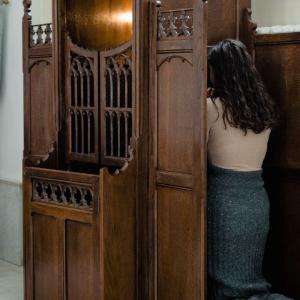When people experience Obsessive Compulsive Disorder (OCD) related to Christianity, it can manifest itself as scruples. OCD is a painful and debilitating mental illness as are scruples.
What are Scruples?
The words “scrupulous” and “scruples,” according to Merriam-Webster, originate from a Latin noun for a small sharp stone. While a sharp stone in a shoe distracts a walker attempting to go somewhere, a scruple is a concern that nags at a person’s mind. Perhaps you want a scrupulous surgeon who carefully checks that all is well before sewing you up. Maybe a scrupulous accountant will check your taxes twice before sending them to the IRS. (Apparently, Scruples is also a line of hair products as well as a television series based on a Judith Krantz novel. Interesting.)
Scruples were more common prior to Vatican II in Catholic circles when the faithful lined up for Confession Saturday evenings to prepare to receive the Eucharist the next day. Religious scruples are recurring fearful thoughts that a person has gravely sinned, is going to hell, or will otherwise receive punishment for sinful thoughts or actions.
My Own Experience
When I was in middle school, I attended an Opus Dei school that catechized via the Baltimore Catechism. We discussed sin on a regular basis in religion class, listened to weekly formation talks, and had Confession afterward. One conversation that I remember concerned whether a person would go to hell if he or she died on the way to confess a mortal sin. The teaching that probably caused me the most trouble was that a person could sin mortally by thinking about committing a mortal sin without doing anything concrete.
Perhaps this last teaching is the reason that stealing and coveting are in the Ten Commandments. A desire to hurt someone can be so powerful that it becomes a sin even if no action is ever taken. In my own case, my brain started thinking about all sorts of sins that I had no intention of ever committing. Fearing hell, I would second-guess myself repeatedly. As a scrupulous Catholic, I frequented the confessional. I did not want to confess to the Opus Dei priests. I tried to resist going to confession at my parish but wound up heading there often so that I could have some peace of mind.

Recovery from Scruples
Time passed and I attended a different high school. A priest’s advice, however, stuck with me. He said that I would absolutely know if I committed a mortal sin. I did not have much trouble with the scruples after that.
Mental health professionals can help people work on scruples as well as on other manifestations of OCD. Mark Shea, in his article, “Bullying the Scrupulous,” says that “diseased religion” can contribute to scruples. I think a focus on sin, penance, and hell for middle school-aged kids is a bit much. Students with fragile psyches are more vulenerable. I do not know how the other girls in my class responded to the teachings we received. They did not seem to react negatively. Since I never talked about what I was going through, others might have suffered similarly.
A Balanced Approach to Goodness and Sin
Discussion about sin without similar treatment of God’s creation, including human beings, as good, can be diseased. We are made in God’s image and likeness. We clearly can sin, but what parent just looks at what their child does wrong without understanding his or her innate goodness? If human parents can do that, God surely must.
I received a peek into the pre-Vatican II Catholic Church in the United States and am relieved that scruples are not as common as they once were. A healthy balance between people’s goodness and capacity to sin is much holier. Unfortunately, scruples are not completely a thing of the past. A scrupulous person cannot simply “get over it,” though their fears may be strange to others. They really need support to overcome them.













